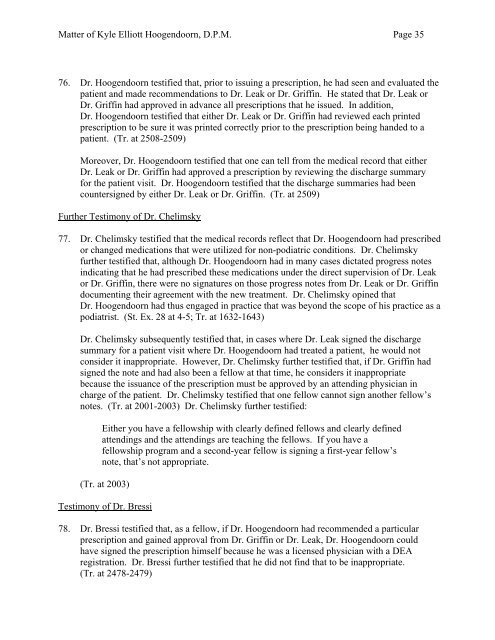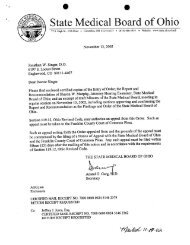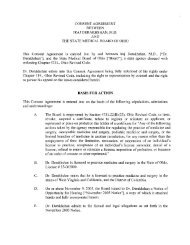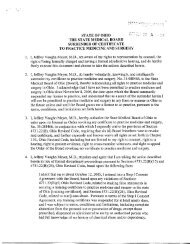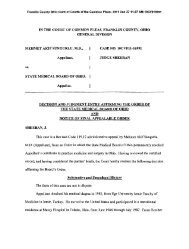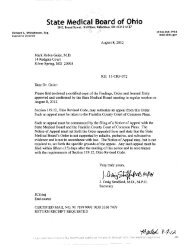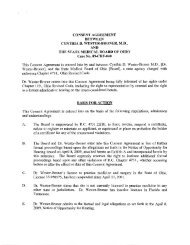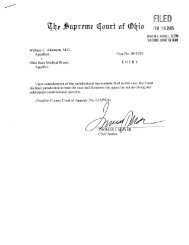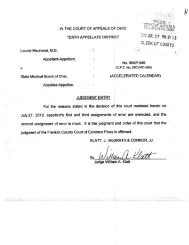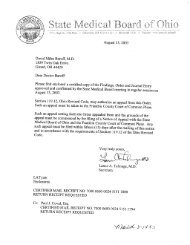CONSENT AGREEMENT BETWEEN - State Medical Board of Ohio ...
CONSENT AGREEMENT BETWEEN - State Medical Board of Ohio ...
CONSENT AGREEMENT BETWEEN - State Medical Board of Ohio ...
Create successful ePaper yourself
Turn your PDF publications into a flip-book with our unique Google optimized e-Paper software.
Matter <strong>of</strong> Kyle Elliott Hoogendoorn, D.P.M. Page 35<br />
76. Dr. Hoogendoorn testified that, prior to issuing a prescription, he had seen and evaluated the<br />
patient and made recommendations to Dr. Leak or Dr. Griffin. He stated that Dr. Leak or<br />
Dr. Griffin had approved in advance all prescriptions that he issued. In addition,<br />
Dr. Hoogendoorn testified that either Dr. Leak or Dr. Griffin had reviewed each printed<br />
prescription to be sure it was printed correctly prior to the prescription being handed to a<br />
patient. (Tr. at 2508-2509)<br />
Moreover, Dr. Hoogendoorn testified that one can tell from the medical record that either<br />
Dr. Leak or Dr. Griffin had approved a prescription by reviewing the discharge summary<br />
for the patient visit. Dr. Hoogendoorn testified that the discharge summaries had been<br />
countersigned by either Dr. Leak or Dr. Griffin. (Tr. at 2509)<br />
Further Testimony <strong>of</strong> Dr. Chelimsky<br />
77. Dr. Chelimsky testified that the medical records reflect that Dr. Hoogendoorn had prescribed<br />
or changed medications that were utilized for non-podiatric conditions. Dr. Chelimsky<br />
further testified that, although Dr. Hoogendoorn had in many cases dictated progress notes<br />
indicating that he had prescribed these medications under the direct supervision <strong>of</strong> Dr. Leak<br />
or Dr. Griffin, there were no signatures on those progress notes from Dr. Leak or Dr. Griffin<br />
documenting their agreement with the new treatment. Dr. Chelimsky opined that<br />
Dr. Hoogendoorn had thus engaged in practice that was beyond the scope <strong>of</strong> his practice as a<br />
podiatrist. (St. Ex. 28 at 4-5; Tr. at 1632-1643)<br />
Dr. Chelimsky subsequently testified that, in cases where Dr. Leak signed the discharge<br />
summary for a patient visit where Dr. Hoogendoorn had treated a patient, he would not<br />
consider it inappropriate. However, Dr. Chelimsky further testified that, if Dr. Griffin had<br />
signed the note and had also been a fellow at that time, he considers it inappropriate<br />
because the issuance <strong>of</strong> the prescription must be approved by an attending physician in<br />
charge <strong>of</strong> the patient. Dr. Chelimsky testified that one fellow cannot sign another fellow’s<br />
notes. (Tr. at 2001-2003) Dr. Chelimsky further testified:<br />
Either you have a fellowship with clearly defined fellows and clearly defined<br />
attendings and the attendings are teaching the fellows. If you have a<br />
fellowship program and a second-year fellow is signing a first-year fellow’s<br />
note, that’s not appropriate.<br />
(Tr. at 2003)<br />
Testimony <strong>of</strong> Dr. Bressi<br />
78. Dr. Bressi testified that, as a fellow, if Dr. Hoogendoorn had recommended a particular<br />
prescription and gained approval from Dr. Griffin or Dr. Leak, Dr. Hoogendoorn could<br />
have signed the prescription himself because he was a licensed physician with a DEA<br />
registration. Dr. Bressi further testified that he did not find that to be inappropriate.<br />
(Tr. at 2478-2479)


